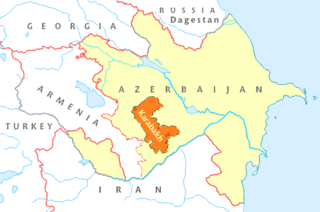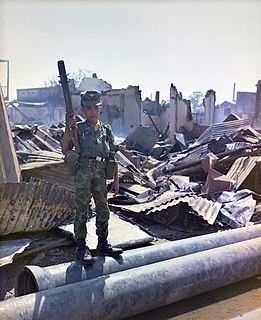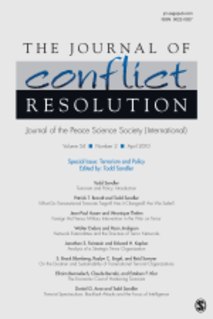Dispute resolution is the process of resolving disputes between parties. The term dispute resolution may also be used interchangeably with conflict resolution, where conflict styles can be used for different scenarios,and is a judicial system which supply a apparatus for resolution of antagonisms between citizens,between citizens and the government,between two state government and between the centre and state governments.
Track II diplomacy or "backchannel diplomacy" is the practice of "non-governmental, informal and unofficial contacts and activities between private citizens or groups of individuals, sometimes called 'non-state actors'". It contrasts with track I diplomacy, which is official, governmental diplomacy that occur inside official government channels. However, track two diplomacy is not a substitute for track one diplomacy. Rather, it is there to assist official actors to manage and resolve conflicts by exploring possible solutions derived from the public view and without the requirements of formal negotiation or bargaining for advantage. In addition, the term track 1.5 diplomacy is used by some analysts to define a situation where official and non-official actors cooperate in conflict resolution.

The three-line United Nations Security Council Resolution 338, adopted on October 22, 1973, called for a ceasefire in the Yom Kippur War in accordance with a joint proposal by the United States and the Soviet Union. The resolution stipulated a cease fire to take effect within 12 hours of the adoption of the resolution. The "appropriate auspices" was interpreted to mean American or Soviet rather than UN auspices. This third clause helped to establish the framework for the Geneva Conference (1973) held in December 1973.

Trilogy: Conflict, Climax, Resolution is the fourth album from alternative hip hop group, Souls Of Mischief. The album was released on the Hieroglyphics Imperium Recordings label on October 24, 2000.

The United Nations Department of Political and Peacebuilding Affairs (DPPA) is a department of the Secretariat of the United Nations (UN) with responsibility for monitoring and assessing global political developments and advising and assisting the UN Secretary General and his envoys in the peaceful prevention and resolution of conflict around the world. The department manages field-based political missions in Africa, Central Asia, and the Middle East, and has in recent years been increasing its professional capacities in conflict mediation and preventive diplomacy. DPA also oversees UN electoral assistance to Member States of the organization. Established in 1992, the department's responsibilities also include providing secretariat support to the UN Security Council and two standing committees created by the General Assembly concerning the Rights of the Palestinian People and Decolonization.

In United Nations Security Council resolution 853, adopted unanimously on 29 July 1993, after reaffirming Resolution 822 (1993), the Council expressed its concern at the deteriorating relations between Armenia and Azerbaijan and condemned the seizure of the district of Agdam and other areas of Azerbaijan, demanding a complete withdrawal from the areas by Armenians.

United Nations Security Council resolution 874, adopted unanimously on 14 October 1993, after reaffirming resolutions 822 (1993) and 853 (1993), the Council expressed its concern at the continuing conflict between Armenia and Azerbaijan in Nagorno-Karabakh, in addition to the inviolability of international borders and the inadmissibility of the use of force for the acquisition of territory, and called upon the parties to observe the ceasefire agreed with by the Government of Russia and OSCE Minsk Group.
Alternative dispute resolution includes dispute resolution processes and techniques that act as a means for disagreeing parties to come to an agreement short of litigation. It is a collective term for the ways that parties can settle disputes, with the help of a third party.

United Nations Security Council resolution 996, adopted unanimously on 30 May 1995, after considering a report by the Secretary-General Boutros Boutros-Ghali regarding the United Nations Disengagement Observer Force (UNDOF), the Council noted its efforts to establish a durable and just peace in the Middle East.

United Nations Security Council resolution 1006, adopted unanimously on 28 July 1995, after recalling previous resolutions on Israel and Lebanon including 501 (1982), 508 (1982), 509 (1982) and 520 (1982) as well as studying the report by the Secretary-General Boutros Boutros-Ghali on the United Nations Interim Force in Lebanon (UNIFIL) approved in 426 (1978), the Council decided to extend the mandate of UNIFIL for a further six months until 31 January 1996.

United Nations Security Council resolution 1036, adopted unanimously on 12 January 1996, after reaffirming all resolutions on Georgia, particularly 993 (1995), the Council discussed efforts for a political settlement between Georgia and Abkhazia and extended the mandate of the United Nations Observer Mission in Georgia (UNOMIG) for another six months until 12 July 1996.

United Nations Security Council resolution 1197, adopted unanimously on 18 September 1998, after reaffirming its primary responsibility to maintain international peace and security, the Council addressed co-operation efforts with the Organisation of African Unity (OAU).

United Nations Security Council resolution 1379, adopted unanimously on 20 November 2001, after recalling resolutions 1261 (1999), 1265 (1999), 1296 (2000), 1306 (2000), 1308 (2000), 1314 (2000) and 1325 (2000), the Council considered provisions to protect children during peacekeeping operations and requested the Secretary-General to identify parties to conflict that used or recruited child soldiers.
Organisation of the Islamic Conference Resolution 10/11, titled "The aggression of the Republic of Armenia against the Republic of Azerbaijan", is an Organisation of the Islamic Conference Resolution on Nagorno-Karabakh conflict adopted by its member states on March 13–14, 2008 during the OIC summit in Dakar, Senegal.

The State Ministry for Reconciliation and Civic Equality is a governmental agency within the Cabinet of Georgia in charge of coordination and monitoring of activities undertaken towards Georgian–Ossetian and Georgian–Abkhazian conflict resolution, generating new peace initiatives and reintegrating the conflict regions and their population with the rest of Georgia. The ministry was established in 2008 and it was known as the State Ministry for Reintegration until 2014. Incumbent minister is Ketevan Tsikhelashvili
United Nations Security Council Resolution 2005 was unanimously adopted on 14 September 2011.

The Office of the Special Representative of the Secretary-General on Sexual Violence in Conflict (OSRSG-SVC), is an office of the United Nations Secretariat tasked with serving the United Nations' spokesperson and political advocate on conflict-related sexual violence, the Special Representative of the Secretary-General on Sexual Violence in Conflict (SRSG-SVC). The Special Representative holds the rank of Under-Secretary-General of the United Nations and chairs the UN Action Against Sexual Violence in Conflict. The mandate of the SRSG-SVC was established by Security Council Resolution 1888, introduced by Hillary Clinton, and the first Special Representative, Margot Wallström, took office in 2010. The current Special Representative is Pramila Patten of Mauritius, who was appointed by United Nations Secretary General António Guterres in April 2017. The work of the SRSG-SVC is supported by the United Nations Team of Experts on the Rule of Law/Sexual Violence in Conflict, co-led by the Department of Peacekeeping Operations (DPKO), Office of the High Commissioner for Human Rights (OHCHR) and the United Nations Development Programme (UNDP), also established under Security Council Resolution 1888.










